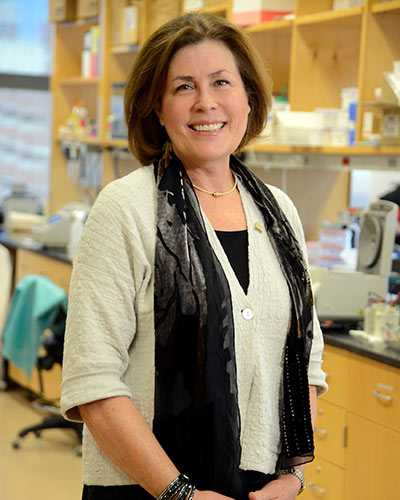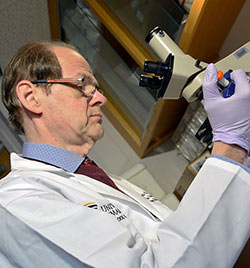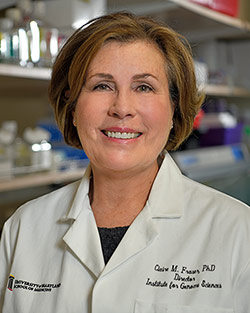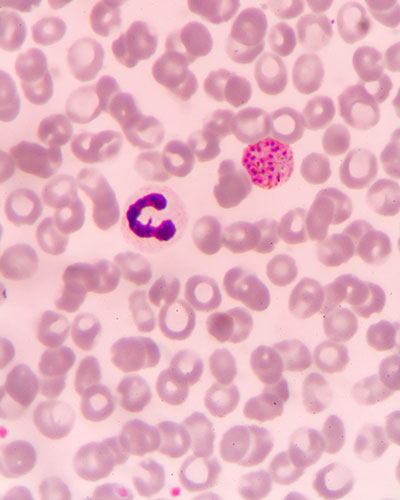May 14, 2018

University of Maryland School of Medicine Study Finds Links between Particular Gut Environment and Resistance to Typhoid Infection
Scientists at the University of Maryland School of Medicine (UMSOM) have for the first time found evidence that the presence of a key species in the human gut microbiome is associated with protection from infection with typhoid fever. If the research is borne out, it could offer an exciting new way to reduce intestinal infections from microbes.
The new study, performed in the UM Cooperative Center for Human Immunology (CCHI), supported by the Division of Allergy, Immunology and Transplantation (DAIT), National Institute of Allergic and Infectious Diseases (NIAID), and the National Institutes of Health (NIH), establishes for the first time that certain gut microbes may keep infection at bay. The work was published today in the journal mBio.
The study’s lead author, Claire M. Fraser, PhD, a professor of medicine at UMSOM as well as director of the school’s Institute for Genome Sciences, said the researchers sought to examine how differences in the gut microbiome might affect infection with typhoid bacteria. “From our previous work we suspected that the microbiome might have an effect on how these illnesses developed in the gut,” says Prof. Fraser. “We wanted to better understand the molecular basis these interactions in the intestinal environment.”

The study was carried out using samples obtained from subjects who had been vaccinated against typhoid, and were subsequently exposed to virulent typhoid bacteria. The vaccine is helpful, but sometimes is not that effective, especially in the developing world. Prof. Fraser and her colleagues found that those who had higher levels of the microbes, which are known as methanogens, were significantly less likely to become sick following exposure, even if they had not been vaccinated.
“We found a strong correlation between the composition and function of the gut microbiome and the clinical outcome following exposure to S. Typhi,” said Prof. Fraser. “One interpretation of these findings is that in some individuals the gut microbiome may offer some protection against infection.” She says that it may also be that people with different microbiomes may respond differently to the vaccine.
Typhoid fever is caused by the bacterium Salmonella Typhi. An estimated 5,700 cases occur each year in the United States. Most infections occur in international travelers. Typhoid fever is common in the developing world, where it affects about 21.5 million people annually, and kills 200,000.
It is not clear exactly how methanogens might help ward off typhoid. Methanogens themselves may keep typhoid at bay, or the presence of these species may create an environment that is hostile to typhoid.

The researchers theorize that methanogens may help reduce the risk of typhoid by reducing the amount of oxygen in the gut. This could potentially reduce the ability of typhoid to thrive. “There are so many questions that this initial set of findings raises. This is step one in a 100-step journey,” she says. Another question is whether methanogens, which have been received little research, may also protect from other intestinal infections.
“Methanogens may be one of the key gut bacteria, and we know very little about them, particularly whether they affect host immunity. The data presented in these studies raised the intriguing possibility that methanogens possess important immunomodulatory functions that could impact clinical outcomes following infection with enteric pathogens” says Dr. Sztein.
The research has broad implications: In the future, Prof. Fraser says, it may be possible to reduce the risk of infection by creating a certain environment that is populated with particular gut microbes.
“This work is not only fascinating, but it will expand a rapidly emerging research area,” said E. Albert Reece, MD, PhD, MBA, Executive Vice President for Medical Affairs at UM Baltimore, and the John Z. and Akiko K. Bowers Distinguished Professor and Dean, University of Maryland School of Medicine. “As we learn more about these microbes, I am sure that Prof. Fraser, the Institute and the School of Medicine will be at the center of this effort.”
About the Institute for Genome Sciences
The Institute for Genome Sciences, founded in 2007, is an international research center within the University of Maryland School of Medicine. Comprised of an interdisciplinary, multidepartment team of investigators, the Institute uses the powerful tools of genomics and bioinformatics to understand genome function in health and disease, to study molecular and cellular networks in a variety of model systems, and to generate data and bioinformatics resources of value to the international scientific community. igs.umaryland.edu
About the Center for Vaccine Development and Global Health
For over 40 years, researchers in the Center for Vaccine Development and Global Health have worked domestically and internationally to develop, test, and deploy vaccines to aid the world’s underserved populations. The CVD is an academic enterprise engaged in the full range of infectious disease intervention from basic laboratory research through vaccine development, pre-clinical and clinical evaluation, large-scale pre-licensure field studies, and post-licensure assessments. CVD has worked to eliminate vaccine-preventable diseases. The CVD has created and tested vaccines against cholera, typhoid fever, paratyphoid fever, non-typhoidal salmonella disease, shigellosis (bacillary dysentery), Escherichia coli diarrhea, nosocomial pathogens, tularemia, influenza, and other infectious diseases.
CVD’s research covers the broader goal of improving global health by conducting innovative, leading research in Baltimore and around the world. CVD researchers are developing new and improved ways to diagnose, prevent, treat, control, and eradicate diseases of global impact. Currently, these diseases include malaria, typhoid, shigella and vaccine-preventable infectious diseases. CVD researchers have been involved in critical vaccine development for emerging pathogens such as Zika and Ebola. In addition, CVD’s work focuses on the ever-growing challenge of anti-microbial resistance. medschool.umaryland.edu/CVD/
About the University of Maryland School of Medicine
Commemorating its 210th Anniversary, the University of Maryland School of Medicine was chartered in 1807 as the first public medical school in the United States. It continues today as one of the fastest growing, top-tier biomedical research enterprises in the world -- with 43 academic departments, centers, institutes, and programs; and a faculty of more than 3,000 physicians, scientists, and allied health professionals, including members of the National Academy of Medicine and the National Academy of Sciences, and a distinguished recipient of the Albert E. Lasker Award in Medical Research. With an operating budget of more than $1 billion, the School of Medicine works closely in partnership with the University of Maryland Medical Center and Medical System to provide research-intensive, academic and clinically-based care for more than 1.2 million patients each year. The School has over 2,500 students, residents, and fellows, and nearly $450 million in extramural funding, with most of its academic departments highly ranked among all medical schools in the nation in research funding. As one of the seven professional schools that make up the University of Maryland Baltimore campus, the School of Medicine has a total workforce of nearly 7,000 individuals. The combined School and Medical System (“University of Maryland Medicine”) has an annual budget of nearly $6 billion and an economic impact in excess of $15 billion on the state and local community. The School of Medicine faculty, which ranks as the 8th-highest public medical school in research productivity, is an innovator in translational medicine, with 600 active patents and 24 start-up companies. The School works locally, nationally, and globally, with research and treatment facilities in 36 countries around the world. Visit medschool.umaryland.edu/
Contact
Office of Public Affairs
655 West Baltimore Street
Bressler Research Building 14-002
Baltimore, Maryland 21201-1559
Contact Media Relations
(410) 706-5260
Related stories

Wednesday, August 28, 2024
Leading Computational Scientist and Oncology Researcher Elana Fertig, PhD, Appointed as New Director of the Institute for Genome Sciences at the University of Maryland School of Medicine
University of Maryland School of Medicine (UMSOM) Dean Mark T. Gladwin, MD, announced today the appointment of Elana J. Fertig, PhD, FAIMBE, as the new Director of the School’s Institute for Genome Sciences (IGS). She is an internationally-recognized researcher known for her work in integrating spatial multi-omics technologies with mathematical models to develop a new predictive medicine paradigm in cancer. Spatial technologies allow researchers to learn about any cell type inside of natural tissue, including gene activity and cell interactions.
.jpg)
Wednesday, May 03, 2023
University of Maryland School of Medicine Genomic Scientist Claire M. Fraser Elected to the National Academy of Sciences
The National Academy of Sciences (NAS) has announced that Claire M. Fraser, PhD, the Dean E. Albert Reece Endowed Professor in the Department of Medicine at the University of Maryland School of Medicine (UMSOM), and the Founding Director of the Institute for Genome Sciences (IGS), has been elected as a new member of the prestigious academy. Dr. Fraser is one of 120 U.S. and 23 international new members elected on May 2, 2023 to the NAS, bringing its total U.S. membership to 2,565 members.

Thursday, July 28, 2022
Researchers Discover One of the Largest Known Bacteria-to-Animal Gene Transfer Inside a Fruit Fly
A fruit fly genome is not a just made up of fruit fly DNA – at least for one fruit fly species. New research from the University of Maryland School of Medicine’s (UMSOM) Institute for Genome Sciences (IGS) shows that one fruit fly species contains whole genomes of a kind of bacteria, making this finding the largest bacteria-to-animal transfer of genetic material ever discovered. The new research also sheds light on how this happens.

Thursday, April 08, 2021
UM School of Medicine Genomics Scientist Claire M. Fraser, PhD, Delivers Passionate Address as Capstone to Her Presidency of American Association for the Advancement of Science (AAAS)
Genomic medicine pioneer and leader Claire M. Fraser, PhD, who is the Director of the Institute for Genome Sciences and the Dean’s Endowed Professor at the University of Maryland School of Medicine (UMSOM), recently concluded her year as President of the American Association for the Advancement of Science (AAAS) with a stirring lecture at the group’s annual meeting.

Tuesday, December 03, 2019
UM School of Medicine Researchers Institute for Genome Sciences' Researchers Discover Potential New Treatment for Tropical Parasitic Disease Using Genomics
Using innovative RNA sequencing techniques, researchers at the University of Maryland School of Medicine (UMSOM) Institute for Genome Sciences identified a promising novel treatment for lymphatic filariasis, a disabling parasitic disease that is difficult to treat. The potential new therapy is an experimental cancer drug called JQ1 and targets proteins found prominently in the worm’s genome; it appears to effectively kill the adult worms in a laboratory setting, according to the study which was published today in the journal mSystems.

Tuesday, August 13, 2019
Researchers Identify How Vaginal Microbiome Can Elicit Resistance or Susceptibility to Chlamydia
The vaginal microbiome is believed to protect women against Chlamydia trachomatis, the etiological agent of the most prevalent sexually transmitted infections (STIs) in developed countries. New research by the University of Maryland School of Medicine (UMSOM) shows how the microbiome can either protect or make a woman more susceptible to these serious infections.

Thursday, April 04, 2019
UM School of Medicine's Institute for Genome Sciences Awarded $17.5 Million Grant for Infectious Disease Research
The Institute for Genome Sciences (IGS) at the University of Maryland School of Medicine (UMSOM) was awarded $17.5 million from the National Institute of Allergy and Infectious Diseases (NIAID) to fund the IGS Genome Center for Infectious Diseases (GCID) for another five years.

Wednesday, March 27, 2019
New Study Finds That Bacteria and Immunity in the Cervix May be Key to Predicting Premature Birth
Spontaneous preterm birth (sPTB), defined as birth before 37 weeks of gestation, and the related complications, are the largest contributors to infant death in the United States and worldwide, according to the World Health Organization. Researchers at the University of Maryland School of Medicine (UMSOM) have discovered that bacteria and innate immune factors in a woman’s birth canal and cervix may increase the risk of spontaneous preterm birth or provide protection against such births.

Tuesday, February 12, 2019
UMSOM Scientists Call for Unrestricted Usage of Public Genome Data
Researchers at the Institute for Genome Sciences (IGS) at the University of Maryland School of Medicine (UMSOM) called for open access to genome data, stating that unrestricted usage is needed for progress in combating the world’s most serious diseases.

Friday, February 08, 2019
University of Maryland School of Medicine Genome Scientists Develop Novel Approaches to Studying the Most Widespread Form of Malaria
Scientists at the Institute of Genome Sciences (IGS) at the University of Maryland School of Medicine (UMSOM) have developed a novel way with genome sequences to study and better understand transmission, treat and ultimately eradicate Plasmodium vivax, the most widespread form of malaria.

Tuesday, January 08, 2019
Top University of Maryland School of Medicine Genomics Scientist Claire M. Fraser, PhD, Appointed President-Elect of American Association for the Advancement of Science (AAAS)
University of Maryland School of Medicine (UMSOM) Dean E. Albert Reece, MD, PhD, MBA, announced today that Claire M. Fraser, PhD, a pioneer in the field of microbial genomics, who is the Dean’s Endowed Professor, Department of Medicine, and Director of the Institute for Genome Sciences (IGS), has been chosen as president-elect of the American Association for the Advancement of Science (AAAS). AAAS is the world’s largest multidisciplinary scientific society and a leading publisher of cutting edge research through its Science family of journals.

Thursday, September 27, 2018
University of Maryland School of Medicine Scientist Receives Prestigious Microbiome Award
Owen White, PhD, professor of epidemiology and public health, and Associate Director for Informatics at the Institute for Genome Sciences (IGS) at the University of Maryland School of Medicine (UMSOM), has received the 2018 Microbiome Pioneer Award. The prestigious honor is part of the Bioinformatics for the Microbiome Symposium organized by Stanford University. The microbiome is the name given collectively to the community of trillions of microbial organisms that live on and within our bodies.

Wednesday, May 25, 2016
UMSOM Researchers Develop New Way to Decode Large Amounts of Biological Data
A University of Maryland School of Medicine researcher has helped develop an innovative computing technique that, on very large amounts of data, is both faster and more accurate than current methods. To spur research, a program using this technique is being offered for free to the biomedical research community.
